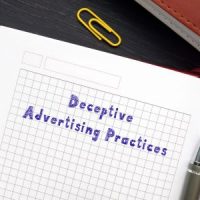FDUTPA Claims: Examples Of What Does And Does Not Constitute False Advertising

We all know how advertising works. A business is trying to sell its products or services. An advertisement is not unbiased or independent. At the same time, it is reasonable to expect companies to make fair and accurate representations in their advertising. Businesses are not supposed to materially mislead consumers.
The Florida Deceptive and Unfair Trade Practices Act (FDUTPA) is a state law that allows businesses and consumers to hold a company liable for damages caused by deceptive/unfair practices, potentially including false advertising. Below, our Miami deceptive & unfair trade practices lawyer explains the key things you should understand about false advertising in Florida.
Understanding False Advertising in Florida
There are a lot of myths and misconceptions regarding false advertising. For its purposes, the FDUTPA instructs Florida courts to refer to the policy of the Federal Trade Commission (FTC). Here are some examples of what does (and does not) constitute false advertising:
- False Advertising (Example #1): Inaccurate objective claim. An inaccurate or materially misleading objective claim can be the basis of a false advertising lawsuit under the FDUTPA. Imagine that an auto dealership advertises itself as having the “lowest prices for makes and models in South Florida, guaranteed.” That is an objective claim. If it is not true, it could be the basis of a false advertising lawsuit.
- False Advertising (Example #2): Material omissions. A material omission of relevant information could serve as the basis of a false advertising claim. While these are more challenging cases than ones involving factually inaccurate objective claims, the FTC has held that a material omission that is designed to mislead a reasonable consumer may be false advertising. The same standard applies under the FDUTPA.
- Not False Advertising (Example #1): Puffed up language. Businesses have the right to use “puffed up” and even hyperbolic language when marketing their products and services. It is not false advertising to use overly puffed up language. The FTC has held that reasonable consumers understand that advertising is, by definition, biased.
- Not False Advertising (Example #2): Subjective claims. A subjective claim is almost never sufficient to warrant liability for false advertising under the FDUTPA. As an example, imagine a car dealership advertised that “great deals available.” In that context, the term “great deals” is purely subjective.
Ultimately, false advertising claims are always adjudicated on a case-by-case basis. The circumstances always matter, including the specific representations that the defendant made and how a reasonable consumer would have likely interpreted that information.
Consult With a Florida Deceptive and Unfair Trade Practices Lawyer for Help
At Pike & Lustig, LLP, our Florida false advertising attorneys have the skills and experience to represent both plaintiffs and defendants in FDUTPA cases. If you have any specific questions about what constitutes false advertising under the FDUTPA, we are here to help. Contact us today to set up your completely private, no commitment initial consultation. From our Miami office and our West Palm Beach office, we work with clients throughout all of Southeastern Florida.
Source:
leg.state.fl.us/statutes/index.cfm?App_mode=Display_Statute&URL=0500-0599/0501/0501PARTIIContentsIndex.html



